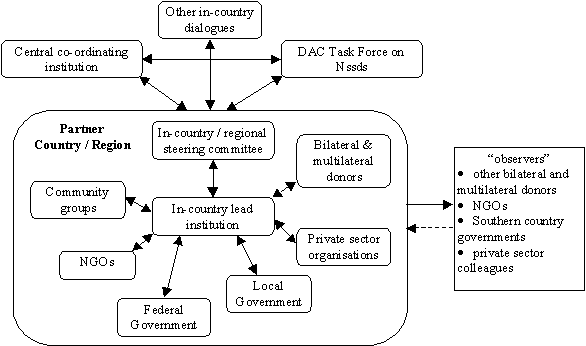Project
Organisation
The project brings
together developing countries and donor agencies in a process of informal
consultation, a dialogue to review experiences with nssds and examine how
donors can best assist in such processes.
Project
Partners
Project
Donors
Coordinating
Institution
DAC
Task Force Members
In Country
Dialogues
Bolivia,
Tanzania, Nepal, Burkina Faso and Thailand.
Each of the
dialogues will be implemented by a in-country or regional team. The dialogues
will involve a status review of strategic planning processes for sustainable
development followed by the dialogues themselves involving stakeholder consultations,
workshops and roundtables (their exact nature will vary). Bilateral and mulitlateral
donors will be an integral part of the in-country dialogues.

Parallel Country
Processes
The project
will also collaborate with and provide limited additional funding to learn
from and build on existing reflective and analytical work on strategic planning
supported by DAC members/observers in Ghana, Namibia and Pakistan.
DAC Task Force
The DAC Working
Party on Development Cooperation and the Environment (WP/ENV) has mandated
a Task Force, co-led by the European Commission and the United Kingdom, to
produce guidance on best practice for assisting developing countries with
the formulation and implementation of nssd processes. It is this taks force
that has commissioned this project.
The Task
Force will be both part of the discussion process and the principle recipient
of the outputs - a sourcebook and guidelines for donors.
The Coordinating
Institution
The Task
Force has contracted the International Institute for Environment and Development
(IIED) tofacilitate and coordinate at the international level the implementation
of the six dialogues and draw lessons from three parallel strategy learning
processes.
This will
involve assistance for planning the approach, tracking progress (ensuring
adherence to the timetable and agreed approach), reviewing and editing mid-term
and final reports, drawing out generic and country specific lessons, developing
an initial draft of DAC policy guidance and a draft sourcebook, and the provision
of networking, liaison and administrative support.
The initial
development of the web based planning support tool is led by the Natural Resources
Institute (NRI), University of Greenwich, UK.





